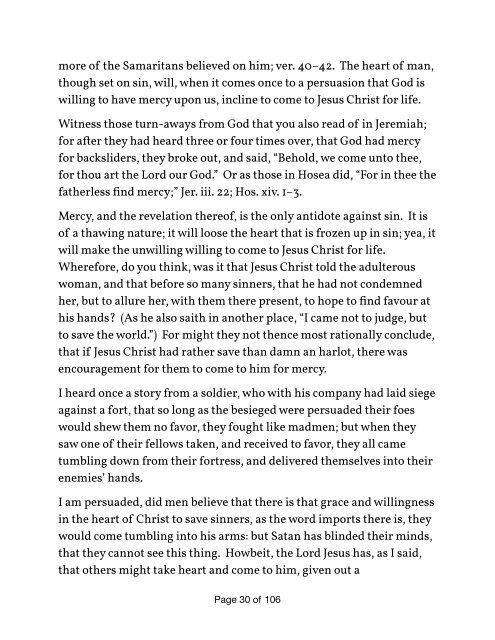The Jerusalem Sinner Saved; or Good News for the Vilest of Men by John Bunyan 1689
An encouraging book for those who feel guilty about their sins. It is a wonderful reminder that Christ's grace to his people knows no bounds and that his power to save even the worst sinner is not limited. "I have been vile myself, but I have obtained mercy; and I would have my companions in sin partake of mercy too: and therefore, I have writ this little book." Thus wrote John Bunyan about this unique gem. The premise of this book is that Jesus wanted his disciples to proclaim the gospel to the worst of sinners - those in Jerusalem who crucified their Messiah. To Bunyan's mind, this was the worst possible sin. The apostles were to begin there, with these worst of sinners, because, in Christ's eyes, they had the greatest need. Also, when they believed in Christ, his name would receive the greatest fame, and thus others would be encouraged to come to Christ. The kingdom of Satan would then be weakened, and the tempted and the weak would be helped. Further, the greatest sinners would love Christ the most when saved, and those who refused to repent would be left with no excuse. To Bunyan's way of thinking, this command to preach the gospel to "Jerusalem sinners" shows the gracious intentions of Christ toward men and his sufficiency to save the worst of sinners, and gives encouragement to those who think that their sin is too great to be forgiven.
An encouraging book for those who feel guilty about their sins. It is a wonderful reminder that Christ's grace to his people knows no bounds and that his power to save even the worst sinner is not limited.
"I have been vile myself, but I have obtained mercy; and I would have my companions in sin partake of mercy too: and therefore, I have writ this little book." Thus wrote John Bunyan about this unique gem.
The premise of this book is that Jesus wanted his disciples to proclaim the gospel to the worst of sinners - those in Jerusalem who crucified their Messiah. To Bunyan's mind, this was the worst possible sin. The apostles were to begin there, with these worst of sinners, because, in Christ's eyes, they had the greatest need. Also, when they believed in Christ, his name would receive the greatest fame, and thus others would be encouraged to come to Christ. The kingdom of Satan would then be weakened, and the tempted and the weak would be helped. Further, the greatest sinners would love Christ the most when saved, and those who refused to repent would be left with no excuse. To Bunyan's way of thinking, this command to preach the gospel to "Jerusalem sinners" shows the gracious intentions of Christ toward men and his sufficiency to save the worst of sinners, and gives encouragement to those who think that their sin is too great to be forgiven.
Create successful ePaper yourself
Turn your PDF publications into a flip-book with our unique Google optimized e-Paper software.
m<strong>or</strong>e <strong>of</strong> <strong>the</strong> Samaritans believed on him; ver. 40–42. <strong>The</strong> heart <strong>of</strong> man,<br />
though set on sin, will, when it comes once to a persuasion that God is<br />
willing to have mercy upon us, incline to come to Jesus Christ f<strong>or</strong> life.<br />
Witness those turn-aways from God that you also read <strong>of</strong> in Jeremiah;<br />
f<strong>or</strong> after <strong>the</strong>y had heard three <strong>or</strong> four times over, that God had mercy<br />
f<strong>or</strong> backsliders, <strong>the</strong>y broke out, and said, “Behold, we come unto <strong>the</strong>e,<br />
f<strong>or</strong> thou art <strong>the</strong> L<strong>or</strong>d our God.” Or as those in Hosea did, “F<strong>or</strong> in <strong>the</strong>e <strong>the</strong><br />
fa<strong>the</strong>rless find mercy;” Jer. iii. 22; Hos. xiv. 1–3.<br />
Mercy, and <strong>the</strong> revelation <strong>the</strong>re<strong>of</strong>, is <strong>the</strong> only antidote against sin. It is<br />
<strong>of</strong> a thawing nature; it will loose <strong>the</strong> heart that is frozen up in sin; yea, it<br />
will make <strong>the</strong> unwilling willing to come to Jesus Christ f<strong>or</strong> life.<br />
Wheref<strong>or</strong>e, do you think, was it that Jesus Christ told <strong>the</strong> adulterous<br />
woman, and that bef<strong>or</strong>e so many sinners, that he had not condemned<br />
her, but to allure her, with <strong>the</strong>m <strong>the</strong>re present, to hope to find favour at<br />
his hands? (As he also saith in ano<strong>the</strong>r place, “I came not to judge, but<br />
to save <strong>the</strong> w<strong>or</strong>ld.”) F<strong>or</strong> might <strong>the</strong>y not <strong>the</strong>nce most rationally conclude,<br />
that if Jesus Christ had ra<strong>the</strong>r save than damn an harlot, <strong>the</strong>re was<br />
encouragement f<strong>or</strong> <strong>the</strong>m to come to him f<strong>or</strong> mercy.<br />
I heard once a st<strong>or</strong>y from a soldier, who with his company had laid siege<br />
against a f<strong>or</strong>t, that so long as <strong>the</strong> besieged were persuaded <strong>the</strong>ir foes<br />
would shew <strong>the</strong>m no fav<strong>or</strong>, <strong>the</strong>y fought like madmen; but when <strong>the</strong>y<br />
saw one <strong>of</strong> <strong>the</strong>ir fellows taken, and received to fav<strong>or</strong>, <strong>the</strong>y all came<br />
tumbling down from <strong>the</strong>ir f<strong>or</strong>tress, and delivered <strong>the</strong>mselves into <strong>the</strong>ir<br />
enemies’ hands.<br />
I am persuaded, did men believe that <strong>the</strong>re is that grace and willingness<br />
in <strong>the</strong> heart <strong>of</strong> Christ to save sinners, as <strong>the</strong> w<strong>or</strong>d imp<strong>or</strong>ts <strong>the</strong>re is, <strong>the</strong>y<br />
would come tumbling into his arms: but Satan has blinded <strong>the</strong>ir minds,<br />
that <strong>the</strong>y cannot see this thing. Howbeit, <strong>the</strong> L<strong>or</strong>d Jesus has, as I said,<br />
that o<strong>the</strong>rs might take heart and come to him, given out a<br />
Page<br />
30 <strong>of</strong> 106

















